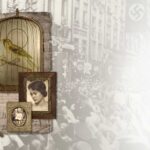

From libraries to bookstores to prisons, book clubs take on a wide range of social and literary configurations, bringing together readers of all ages and walks of life.
I have never belonged to a book club, yet as I embarked on this story I realized I had a preconception: an image of Jane Fonda and Diane Keaton clutching books, wearing tortoiseshell specs and sipping Chardonnay. I blame The Book Club movie trailers.
When I met Judy Kaufmann and Erin O’Sullivan I rather awkwardly brought up the stereotype, and they just laughed, “White-haired ladies and Chardonnay, right?”
They may not look a million miles away from the stereotype, but the truth is, together with a third volunteer, Judy and Erin run a very different kind of book club – inside Warkworth Institution. There are more tattoos than white hair, and definitely no Chardonnay.
BOOK CLUBS FOR INMATES (BCFI)
This Canada-wide organization, administered by a small national team, is celebrating 15 years of bringing a breath of outside air to incarcerated people via books. Margaret Atwood is a patron, and volunteers like Judy and Erin run the book clubs in prisons across the country. Once a month they pass through prison security, heavy doors clanging shut behind them, carrying nothing but a book and a journal, to bring “book clubs to the big house.”
“Honestly, I get as much out of it as the inmates,” Judy says.
Erin agrees. “Prison social programs have been slashed, so inmates are grateful for anything they get, and we enjoy it, too. We’ve never had any trouble. It’s a book club! We talk about books, share ideas and thoughts and how we feel about a book.”
Sadly, but not surprisingly, she hears disparaging remarks about her efforts. “If someone says I’m wasting my time and taxpayers’ money I point out these guys are all getting out some day. Anything we can do to help them stay connected to the outside world, stay connected to community and mindful living is not a waste. And anyway, it’s not government funded.”
BCFI also runs ChIRP (Children of Inmates Reading Program). “An inmate with a child on the outside, son, daughter, grandchild, whatever, can choose an appropriate book to read and record. Then the book and recording of their voice are sent to the child. Isn’t that a beautiful thing?” Prisoners don’t have Zoom, and ChIRP is a powerful way to stay connected to a child.
For the book clubs, BCFI provides two or three hundred titles submitted by a team of about eight volunteers who read and vet prospective books all year. “We choose about 50 from that list and give it to give it to the inmates with about a month to choose,” says Erin.
“I’m a retired elementary school teacher and this will sound like something straight out of school,” laughs Judy, “but we give them coloured dots to put beside the books they want to read.” Twelve dots for twelve meetings a year. Far from finding that condescending, inmates are happy to be given a choice. They don’t get to make decisions about much else in prison. “Sometimes guys ask if they can put all their dots on one book to bump up its chances,” says Judy. “We say yes they can!”
There are 15 inmates in the book club at any one time, and they take it seriously, making diverse choices, from Rick Mercer’s Talking to Canadians to Jo Nesbo’s thriller, Macbeth.
Erin recalls when they read The Cellist of Sarajevo, “Carol Finlay (founder of BCFI) came to our meeting with a recording of someone playing the cello. Some of the men had never heard a cello,” she says with a catch in her voice. “It was a very moving moment. It made the story more real for them.” “We try to make connections, find themes,” she says. “How does this connect to the outside world for you, people in your life? to other books you’ve read? Every man in there has violated an important community rule. We want to help them come back to a community with some ability to interact appropriately. Books can engender compassion, empathy, show how other people deal with life.”
Just like on the outside, book club discussions can get animated. “There are three rules,” says Erin firmly. “You have to read the book! Otherwise it’ll be hard finding things to talk about for two hours. There’s no interrupting, which is important because this group tends to attract big talkers. No making fun of anybody. Respect when it’s their turn to talk, respect their opinions, keep it positive.” As with any book club, Erin and Judy sometimes have to draw out reticent members.
BCFI relies on donations, fundraising and grants, but it gives the books to inmates to keep – if they choose. Prisoners can only have a certain number of possessions. “Sometimes if they want to keep the book, rather than give it to the library or another inmate, they’ll have to give up something else,” says Judy. “It’s an interesting way to frame the question ‘How did you feel about this book?’” It made me think about just how much owning a book can mean.
After thirteen years running the Warkworth Prison book club, Judy and Erin have a lot of stories to tell. They recall asking the group, “Who would you recommend this book to?” and hearing, “Someone going into The Hole.” Judy shakes her head and smiles. “We might say it’s a good beach read, they give it a thumbs-up for reading in Solitary.”
LET’S TALK BOOKS – COBOURG
At Cobourg’s little independent bookstore, owner Jenny Bogart Jaquith hosts three, count ’em, three book clubs. What started as a handful of like-minded customers grew into a crowd of readers big enough to split into three. Two focus on single genres: mystery and historical fiction, while the third is general interest, everything from autobiography to science fiction.
“There are other local book clubs,” says Jenny, “who get together at each other’s houses, but we meet right here in the shop.”
Membership fluctuates, but never goes above 15 for any group. “We plan our year’s books in advance, so there’s lots of time to read, and members can decide if they want to come to all the meetings or skip one or two.”
“There’re not too many rules. And they’re not my book clubs,” she says firmly. “I just host them. They’re free to attend, but I do ask that you buy the books here if possible,” she laughs. “Helps me stay in business!” But if it’s not financially viable or she’s run out of copies and you source books somewhere else, you won’t be drummed out of the club. Why do people love book clubs? Jenny thinks about that. “It’s very social. We give everyone a chance to talk about what they liked and didn’t like, then we usually veer off into conversation about themes and topics the book has brought up. It could be how it relates to something in current news, or women’s rights, or just feeling thankful we don’t live the way some people did, or do. With historical fiction, especially, it’s recognizing parallels between the past and what’s happening now.”
The best conversations are when things are controversial. “If one or two people absolutely hated the book but everybody else loved it, that makes a good discussion,” she says with relish. “Book clubs get you out of your bubble, not just reading things chosen by someone else, but talking to people with different ideas. Sometimes hard things are easier to talk about when they’re framed inside a story.
“How do we pick books? We usually stick to newer releases to be sure not everybody’s already read them,” she says. “I always ask people what they’re reading, who their favourite authors are, and we read reviews, ask people for recommendations.”
Occasionally a local author will approach Jenny and ask if they can offer their work to the book clubs. “I always say we’re member driven; I’ll present it and they will decide,” she says. “That takes the onus off any one person having to make the decision, and it’s less disheartening if we say no.”
Jenny’s laid-back, welcoming style sets the tone for the clubs at Let’s Talk Books, where commitment sits comfortably alongside “come if you want to.”
Jenny’s style may be laid back, but she’s creative, clever … and canny.
“I felt irrationally pleased to be witnessing the power of book clubs to connect people and fill human needs beyond sharing a good read.” JANET DAVIES
QUINTE WEST LIBRARY – TRENTON
The Trenton branch of Quinte West Library hosts its own Reading With Friends book club. When I ask about it, receptionist Lainie Lanto says, “You better talk to Billie. She’s been running it for 25 years.” She then fills me in on how she assists other local book clubs, ordering multiple copies through the inter-library loan system and putting together bundles for collection. “It’s the honour system,” she says. “We don’t sign them out individually as long as one person takes responsibility.”
While I admired a dozen or so book bundles, a woman approached Lainie looking for help in joining a book club. I brazenly joined the conversation. She shyly told me she was recently widowed, feeling lonely, in need of conversation and company. I felt irrationally pleased to be witnessing, in real time, the power of book clubs to connect people and fill human needs beyond sharing a good read.
At the same library, Jeanette deBoer runs a Teen Book Club. She laughs about that book club stereotype, too. “Nope, there’s no Chardonnay. But we’re talking teenagers here. Of course we lure them in with snacks!”
Starting slowly in 2021, the club picked up momentum and has grown steadily with 13 kids now signed up. “We meet every six weeks, which gives lots of time to read the book without it feeling like homework. You’d be surprised how many teens still read a lot, even in these times,” she says. “I read the books, too, and prepare questions to get things started. But it’s so interesting to hear their perspectives. Young adult books deal with a lot of issues, mental health, human trafficking, and they take the discussions seriously.” In fact the kids be can be sharply critical. They loved The Court of Miracles, by Kester Grant, “set in a violent urban jungle in an alternative 1820s Paris where La Révolution has failed,” but found another book, set in modern times, frankly condescending. “They didn’t like the way the author treated mental health issues,” says Jeanette. “They felt it trivialized something that happens to most teens.”
Later that day, I phone Billie Yakachuck. This time I am talking to a white-haired lady, but having come in from the garden to answer the phone, she likely wasn’t sipping wine.
The venerable Reading With Friends book club was started, appropriately, by the Friends of Quinte West Library in 1997 and currently has 45 members.
Each year, members suggest books to be vetted by library staff for availability. Their monthly meetings last about an hour and a half and are pretty social.
Often whoever chose the book gives a bio of the author, then everyone has a chance to speak. “We’re not strict. You can comment on something that’s said and we’ll have a bit of free conversation, but we always get back on track for the next person to speak. Not all book clubs do that,” she says wryly. “I’ve been to some where two people out of a dozen monopolize the conversation. Some people like to hear themselves talk,” she says with a smile, “that’s why you need someone to manage the meeting.”
Why are book clubs so popular? She thinks about it. “It’s like getting together with friends, it’s social. Is it mostly women? “It’s not just for women, but over the years we’ve had about four men. They don’t last,” she chuckles. “Maybe they feel outnumbered.” I can hear the grin in her voice.
I mention that Erin O’Sullivan thought it would be good to have book clubs in seniors’ homes. Did she think that would work? “I don’t know, but I’m getting to the age where I might find out,” she says. Billie is 85. “I’m thinking of slowing down, but I’m sure somebody else will take over the book club. It’s very popular.” She’s right. After 27 years, Reading with Friends is going strong, no Chardonnay required.
THRIVE – PRINCE EDWARD COUNTY
I was surprised to learn there are more than 30 book clubs in Prince Edward County. I heard this from Jenny Kingman at the beautifully renovated Picton Library, who handles inter-library requests for many of them. “Yes, it keeps me busy,” she smiles.
The newest book club in the County grew out of Thrive PEC, a loose-knit group interested in local social, economic and developmental issues. Their website thrivepec.ca explains its creation, inspired by Zita Cobb, whose ideas revitalized Fogo Island when it faced challenges similar to those of the County. But what’s that got to do with books and book clubs? Susan Smythe-Bishop explains.
Susan is an avid reader of books on leadership and development. “They got me through my career,” she laughs. “At a symposium we hosted in the spring of 2023, one thing we talked about was the negativity on social media, even on cheery local community group pages. It’s disheartening how quickly something that starts, ‘Hey we just painted the church hall ceiling!’ can deteriorate into sniping.” she says. “I kept wanting to recommend books to the negative people. Maybe I’m naïve, but I wanted to say, ‘Hey, you should read No Complaining by Jon Gordon!’” She proposed starting a non-fiction book club just to get people talking about positivity. “Books about change, personal development, community leadership. It was just an idea,” she says. “I never thought it would be me doing it!”
Susan had never belonged to a book club herself. But when a friend followed up, “I googled how to start a book club. I worked in event planning, so I thought, how hard can it be? I told David Sweet at Books & Company (Picton’s independent bookstore) that I wanted to focus on books about leadership and personal development. He said, ‘Not a big demand for that. But tell me what you have in mind and I’ll order a few copies.’” Alexandra Bake at Picton Library said the same.
Thrive put their thoughts out on social media, and suddenly Susan had 20 names. “We’re up to 54 now, but thank God they’re not all active,” she laughs. “We had 17 at the first meeting and I was floored. I told David about the response and he said “Oh I know! I’ve ordered more books!”
With an average of 16 attendees, they gather at local businesses, which dovetails nicely with Thrive’s belief in supporting the local economy. They recently met at Stella’s restaurant in Waupoos. “We read Braiding Sweetgrass, a marvellous book by Robin Wall Kimmerer. Stella’s owner Leah is Indigenous with a similar background to the author’s, and the dinner honoured the concept of Three Sisters, corn, squash and beans,” says Susan.
So who are the members of this non-fiction book club? “We’re a mixed bunch,” she says. “To some degree it’s bringing together multigenerational County people and newcomers. The attraction is we’re reading and talking about ideas and issues that relate to our lives, our community, even our economy.”
The book club has taken a turn from what she originally thought. “I was all about leadership books, but members suggested a lot of others they wanted to read, so I have begun reading things I would never have chosen before. One of the most important criteria is do we think it will stimulate discussion? And they all have!”
BELLEVILLE LIBRARY
It’s not a Carnegie, but Belleville Public Library is an important gathering place and an impressive building. The library hosts two well-attended book clubs; in fact, the Afternoon Book Club and the evening Fireside Book Club are at capacity. The club’s autumn reading lineup included thrillers, historical fiction, breezy reads and classics, including The Catcher in the Rye, perhaps thumbing its nose at book banning across the border. Who chooses the books? “I do,” says young librarian Jenny Pust.
I have turned up unannounced (again) and Jenny would probably be happier getting on with work rather than talking to me, but she warms to the subject, perhaps because she can see I am genuinely interested in how this book club stuff works.
“There are a lot of book clubs in Belleville,” she says. “You can probably find them on Facebook.” When I make no move to leave, she smiles and leans forward a little behind the plastic screen, and gives me her full attention.
“Most of the book clubs out there source their books through us,” she says. It’s that wonderful inter-library service again. “One person will gather their friends’ library cards and bring them in to collect all the copies from us.” She continues, “For the book clubs that we host right here, I do the choosing. I look up reviews and I go to the different library sites to see what’s available. New books are tricky to get hold of, of course,” but she can order in advance.
Jenny opens my eyes to other factors that have to be considered. “I go for books that are not too long,” she says, “and some people only use e-readers, so I gravitate to books that I know are available as e-books.” She does a good job mixing up genres. “I actually threw in some science fiction last year,” she laughs. It was the Hugo-award winning To Say Nothing of The Dog, by Connie Willis, a mix of social satire, rom-com and time travel. Some members had never read sci-fi before, but everybody gave it a chance.
“Book clubs can definitely change your perspective,” she muses. “Reading somebody else’s choice of books can get you out of a reading rut, and it’s a fun way to connect with people.” Even if you’re a bit shy? She gives me a look, but agrees. “It’s a good way to socialize with like minds.” After all, just the fact you’re in a book club together means you’ve got something in common. Right?
As I review all I’ve learned about book clubs, I think I’ll look into the groups here in the County. There’s bound to be one within striking distance of Cherry Valley. And winter is coming!
Story by:
Janet Davies


